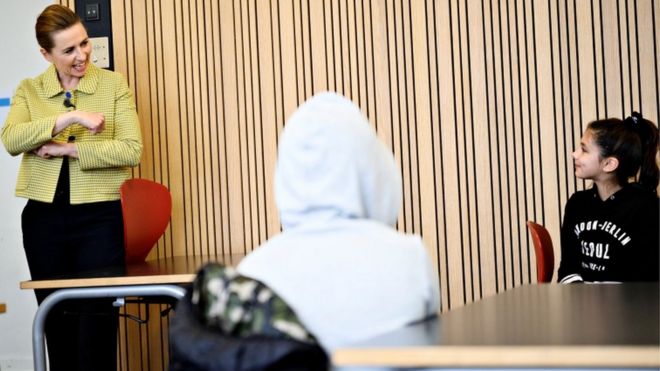Children up to the age of 11 are
returning to nurseries and schools across Denmark, as the government
becomes the first in Europe to relax coronavirus restrictions on
education.
Prime Minister Mette Frederiksen welcomed children as they went back to school in the capital Copenhagen.Denmark was among the first countries in Europe to impose a lockdown, with schools closed on 12 March.
Infection rates have been low but critics warn the strategy is risky.
Other countries besides Denmark have moved to relax lockdown measures this week:
- Austria reopened thousands of smaller shops on Tuesday
- The Czech government has set out a five-stage timetable
- Spain has allowed non-essential workers to go back to work after a two-week pause
- Italian bookshops and clothing stores for youngsters have reopened their doors in some regions
Spain reported another 523 deaths on Wednesday and a 3% increase in infections but officials said the rise in new cases may have been due to a delay in reporting because of the Easter break.
What has Denmark done?
Denmark has so far reported 299 deaths and 6,681 positive cases, although many more are thought to be infected.It has been widely praised for its swift action in restricting movement before Covid-19 infections were able to spread across the population - leading it to be compared to South Korea.
What is happening in Germany?
Angela Merkel held talks with cabinet ministers on Wednesday before discussing an easing of measures with Germany's 16 states.According to reports in German media, shops of up to 400 sq m (4,300 sq ft) will be allowed to reopen from 20 April subject to strict conditions on the number of customers allowed in at a time. Larger stores would then be allowed to reopen from 4 May along with hairdressers.
Curbs on people's movement are likely to remain in place up until 3 May.
Some of Germany's states disagree on how to relax restrictions. North Rhine-Westphalia, Germany's most populous state, aims to reopen schools gradually starting with primary schools from the start of next week. Bavaria's state premier, Markus Söder, believes that is too soon.
Germany's RKI public health institute has said the number of deaths from coronavirus has risen by another 285 in the past 24 hours to 3,254, which is relatively low for a population of 83 million. It now has 127,584 positive cases.
The economy ministry said Germany fell into recession last month and is unlikely to come out of it before mid-2020.
https://www.bbc.com/news/world-europe-52291326

